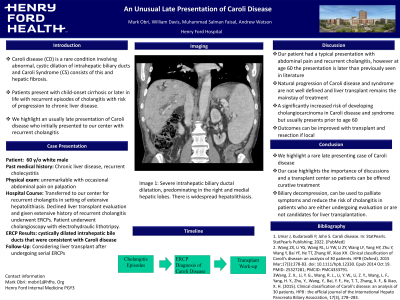Monday Poster Session
Category: Biliary/Pancreas
P1576 - An Unusual Late Presentation of Caroli Syndrome
Monday, October 23, 2023
10:30 AM - 4:15 PM PT
Location: Exhibit Hall

Has Audio
- MO
Mark Obri, MD
Henry Ford Hospital
Detroit, Michigan
Presenting Author(s)
Mark Obri, MD, William Davis, DO, Muhammad Salman Faisal, MD, Andrew Watson, MD
Henry Ford Hospital, Detroit, MI
Introduction: Caroli syndrome is a rare autosomal recessive disorder which usually presents in early childhood. It is characterized by cystic dilation of the intrahepatic biliary tree and recurrent episodes of cholangitis with risk of progression to chronic liver disease. It is associated with the autosomal recessive polycystic kidney disease (ARPKD) gene and frequently requires endoscopic retrograde cholangiopancreatography (ERCP) for management of biliary obstruction. We present a rare case of a middle-aged man who suffered from recurrent cholangitis in setting of hepatolithiasis and was subsequently diagnosed with Caroli syndrome.
Case Description/Methods: Patient is a 60 year old male with chronic liver disease and suspected Caroli syndrome who was referred to our center for recurrent cholangitis in setting of extensive hepatolithiasis. He was initially referred to our hepatology colleagues for consideration of liver transplantation. Patient declined liver transplant evaluation and, given suspected Caroli syndrome with extensive hepatolithiasis and recurrent cholangitis, he opted to proceed with ERCP for further management. His repeat ERCP at our institution showed extensive hepatolithiasis with cystically-dilated intrahepatic bile ducts that was consistent with Caroli syndrome. Given findings, cholangioscopy with electrohydraulic lithotripsy was performed. Repeat ERCP was performed in 3 months for further stone extraction. The patient is planning to pursue serial ERCPs in an attempt to maintain biliary drainage and reduce risk of cholangitis while he considers liver transplant evaluation.
Discussion: Caroli syndrome is rare and 80% of cases typically present before the age of 30. However, in a patient with chronic liver disease and cystic dilation of the intrahepatic biliary tree with hepatolithiasis and recurrent episodes of cholangitis, Caroli syndrome should be considered. Once a patient develops cirrhosis, liver transplant remains the mainstay of treatment. Biliary decompression, either via ERCP or percutaneous drainage, can be used to palliate symptoms and reduce the risk of cholangitis in patients who are either undergoing evaluation or are not candidates for liver transplantation.

Disclosures:
Mark Obri, MD, William Davis, DO, Muhammad Salman Faisal, MD, Andrew Watson, MD. P1576 - An Unusual Late Presentation of Caroli Syndrome, ACG 2023 Annual Scientific Meeting Abstracts. Vancouver, BC, Canada: American College of Gastroenterology.
Henry Ford Hospital, Detroit, MI
Introduction: Caroli syndrome is a rare autosomal recessive disorder which usually presents in early childhood. It is characterized by cystic dilation of the intrahepatic biliary tree and recurrent episodes of cholangitis with risk of progression to chronic liver disease. It is associated with the autosomal recessive polycystic kidney disease (ARPKD) gene and frequently requires endoscopic retrograde cholangiopancreatography (ERCP) for management of biliary obstruction. We present a rare case of a middle-aged man who suffered from recurrent cholangitis in setting of hepatolithiasis and was subsequently diagnosed with Caroli syndrome.
Case Description/Methods: Patient is a 60 year old male with chronic liver disease and suspected Caroli syndrome who was referred to our center for recurrent cholangitis in setting of extensive hepatolithiasis. He was initially referred to our hepatology colleagues for consideration of liver transplantation. Patient declined liver transplant evaluation and, given suspected Caroli syndrome with extensive hepatolithiasis and recurrent cholangitis, he opted to proceed with ERCP for further management. His repeat ERCP at our institution showed extensive hepatolithiasis with cystically-dilated intrahepatic bile ducts that was consistent with Caroli syndrome. Given findings, cholangioscopy with electrohydraulic lithotripsy was performed. Repeat ERCP was performed in 3 months for further stone extraction. The patient is planning to pursue serial ERCPs in an attempt to maintain biliary drainage and reduce risk of cholangitis while he considers liver transplant evaluation.
Discussion: Caroli syndrome is rare and 80% of cases typically present before the age of 30. However, in a patient with chronic liver disease and cystic dilation of the intrahepatic biliary tree with hepatolithiasis and recurrent episodes of cholangitis, Caroli syndrome should be considered. Once a patient develops cirrhosis, liver transplant remains the mainstay of treatment. Biliary decompression, either via ERCP or percutaneous drainage, can be used to palliate symptoms and reduce the risk of cholangitis in patients who are either undergoing evaluation or are not candidates for liver transplantation.

Figure: Image 1: Composite Imaging of Caroli Syndrome Showing Image from ERCP and CT Liver
Disclosures:
Mark Obri indicated no relevant financial relationships.
William Davis indicated no relevant financial relationships.
Muhammad Salman Faisal indicated no relevant financial relationships.
Andrew Watson indicated no relevant financial relationships.
Mark Obri, MD, William Davis, DO, Muhammad Salman Faisal, MD, Andrew Watson, MD. P1576 - An Unusual Late Presentation of Caroli Syndrome, ACG 2023 Annual Scientific Meeting Abstracts. Vancouver, BC, Canada: American College of Gastroenterology.
